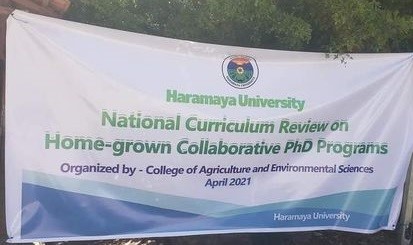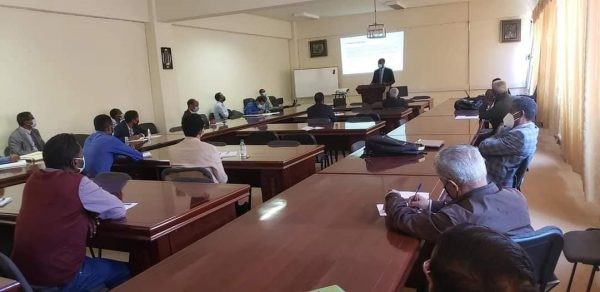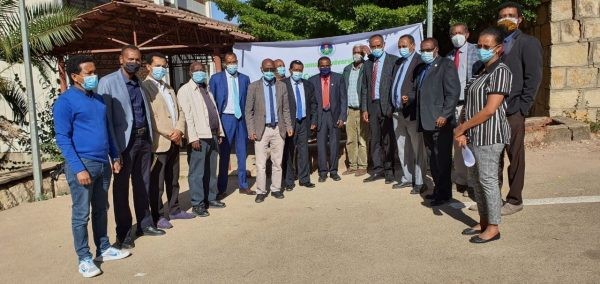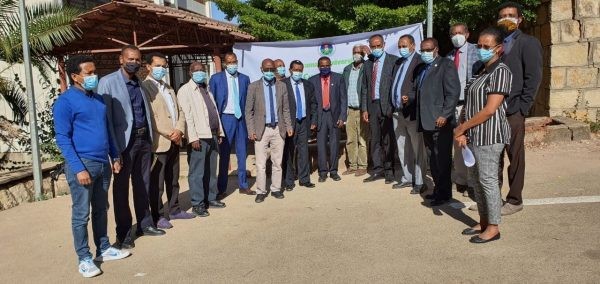A National Curriculum Review for home grown PhD program was held at Haramaya University in the building College of Agriculture the University on April 9, 2021.
Haramaya University is a pioneer higher learning institution which has been actively involved in research activities, primarily in the fields of agriculture, since its inception. Through the years, the institution has established linkages with national and international organizations to strengthen its academic, research and outreach activities.

As a pioneer institution of agricultural teaching, research and extension in Ethiopia, over the last 65 years, Haramaya University has developed and released several improved crop varieties and many improved crop and livestock management practices.

According to Zelalem Bekeko (PD), Dean, College of Agriculture and Environmental Sciences, currently there is an urgent need for the University to make efforts to link its academic programs to its research and outreach activities in order to make its training programs relevant to the needs of the stakeholders and the country at large. This requires the need to make proper linkages with various stakeholders that include the rural community, urban dwellers, the private sector, governmental organizations and non-governmental organizations at national and international levels, he explained. In this regard, the College of Agriculture and Environmental Sciences is a fulcrum of the agricultural innovation and rural transformation in the country through undertaking agricultural education and research activities, the Dean added.
The original curriculum of the College catered for producing graduates in B.Sc. in general agriculture; however, the quest for keeping up with the training needs of the country led to the development of new programs of study, such as Animal Science (1960), Plant Science (1960), Agricultural Engineering (1961), Agricultural Economics (1962), and Agricultural Education (1967), and diploma in Home Economics (1967). Then, a BSc program in Agricultural Extension was started in 1994 which was later renamed as Rural Development and Agricultural Extension.
A major landmark in the history of the College of Agriculture and Environmental Sciences was the launching of graduate study programs in the 1979/80 academic year. This laid down the foundation for advanced academic and research work at the institution.

Currently, the College is running more than 10, 28 and 14 BSc, MSc and PhD programs, respectively under five schools. The running of these programs in the College has tremendously contributed to the upgrading of the University to be one of the research and post graduate level higher learning institutions in the country. Congratulations!!
Currently, the Ministry of Science and Higher Education (MoSHE) of Ethiopia has undertaken reform initiatives to address the challenges. Among the initiatives, the policy and strategies for higher education and training are revised in which professors in academia, senior experts in different areas, various industries including private sectors, regional government and respective bureaus of education and training, and higher education institutions (HEIs) have actively engaged through the home grown collaborative PhD program.

Home-Grown Collaborative PhD Program (HCPP) is a doctoral program in which different HEIs work collaboratively through sharing their staff, finance, infrastructure and facilities to run the doctoral program. It gives wider opportunity to PhD students to work with supervisors, mentors and peers from different disciplines and institutions.
It mobilizes professors in academia, research, industry and Diaspora to teach, supervise and mentor the PhD students across all host and co-host universities in Ethiopia. HCPP will use available local and international research infrastructure and facilities (laboratories, workshops, instruments, experiences, knowledge, expertise skill etc) through collaboration, relationship and networking.
It also promotes local collaboration between public-public and public-private institutions. Its financial resources will be mobilized from partners, donors, stakeholders and government through grant, joint projects/research, donation, and other means of funding via inter-institutional agreements.

HCPP gives wider opportunity for private sectors to jointly establish national advanced provide/get scientific services providing laboratories and workshops while undertaking PhD research activities.
Therefore, HCPP is beyond enhancing relevance and quality of PhD programs in HEIs. It will foster sustainable local and international collaboration and partnership among institutions, build in home capacity for research and advanced scientific services, increase efficiency of the system through holistic resource sharing, integrate research and academia with industry and national development priorities, helps to coordinate multi-sect oral moves with national priorities.
Through this program the College of Agriculture and Environmental Sciences is vested in power to host and co-host various PhD programs ( Animal Breeding and Genetics, Plant Breeding and Genetics, Agronomy, Horticulture, Plant Pathology, Agricultural Entomology, Dairy Science and Technology, Applied Soil Sciences, Rural Development, Agric business and Value Chain Management).
The launching of these programs in the College enhances and boosts the visibility of Haramaya University. It also helps the institution to align its research and community service resources (human, financial and material) with this program. In addition it also contributes in transforming the capacity of the institution for advanced scientific service delivery and materializes the program sustainability. The development sectors and/or industries will also benefit immensely from HCPP through research outputs and advanced scientific service delivery since the thematic research areas are in line with national development priorities.
Dr. Zelalem emphasized that College of Agriculture and Environmental Sciences can strongly host and co-host the envisioned PhD programs in the upcoming five years and realize the vision of the Haramaya University.

